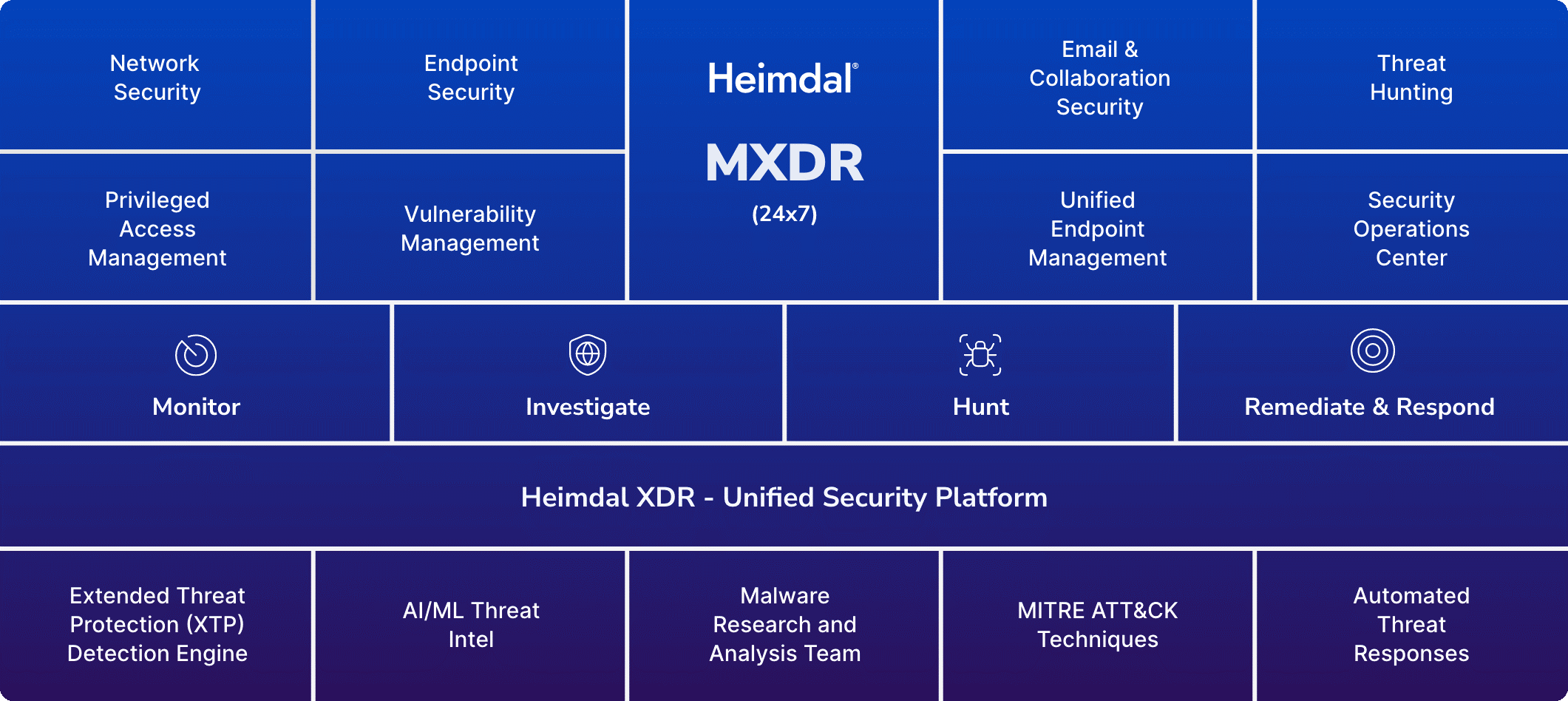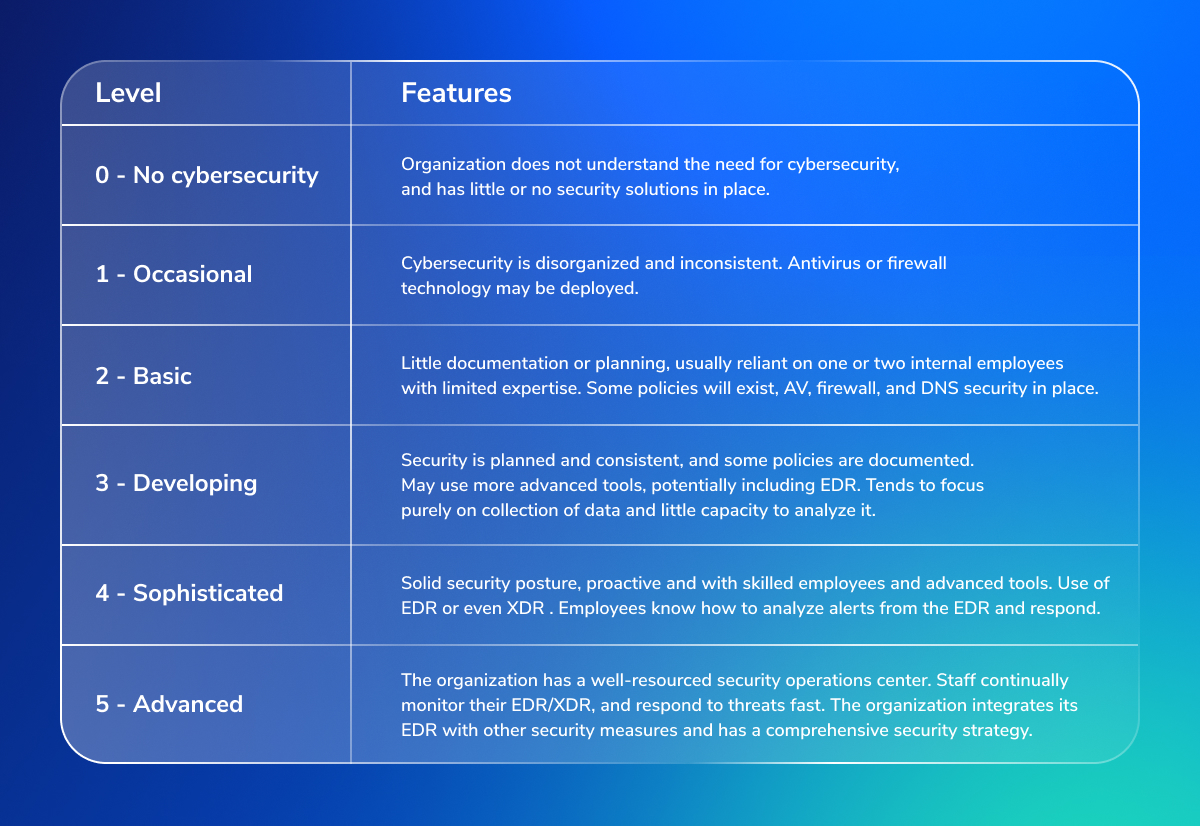For many cybersecurity professionals, there comes a time when you need to weigh up outsourcing security to a Managed Security Service Provider (MSSP), versus keeping those tasks in-house by building your own Security Operations Center (SOC). So, we will be discussing MSSP vs. SOC.
There are several reasons you might be comparing using an MSSP vs. SOC. Perhaps your company is growing fast, and needs a more dedicated security function. Maybe a company has hired you to ‘fix’ its problematic security. Or you might be dealing with the aftermath of a breach and need to find a better way of protecting your business.
This article will help you compare using an outsourced MSSP vs. SOC in-house, and the key differences between the two.
MSSP vs. SOC – Two Approaches to Security
Before comparing key differences between MSSP’s and SOC’s, it’s valuable to define exactly what we mean by each term.
What Is An MSSP?
A Managed Security Service Provider (MSSP) is a company that provides outsourced cybersecurity. They will typically offer a wide range of services, from installing firewalls, to deploying antivirus, setting up endpoint detection and response and XDR, monitoring systems for security incidents, rolling out multi-factor authentication and other activities.
You will enter a contract with the MSSP which defines what type of security services they’ll offer. These can range from very comprehensive, with analysts dedicated to monitoring your company systems, right through to ‘light touch’ or automated monitoring and a help desk.
What Is a SOC?
A Security Operations Center is an in-house cybersecurity unit that is dedicated to managing your organization’s security posture. It is staffed by security experts and security analysts who work to continually monitor your environment, hunt for threats, respond to security incidents, produce reports, and ensure you stay compliant.
The SOC will define your security policies, manage various kinds of security software, and be the organization’s ‘guiding mind’ for all things security related.
Related: MSP vs. MSSP
MSSP vs. SOC – Pros And Cons of Each Approach
Trying to decide whether you should outsource to a Managed Security Service Provider or do it yourself and set up a SOC?
There isn’t a ‘right’ answer here. Sometimes an MSSP will be the perfect solution, other times an SOC is preferable. You might even choose to blend the two approaches (more on this below).
But to help you weigh it up, we’ve listed key advantages and drawbacks of MSSPs and SOCs.
Pros And Cons of Managed Security Service Providers
Working with a Managed Security Service Provider can be a great option. But it’s worth considering the drawbacks too.
Advantages of working with an MSSP
I build SOCs and have run SOCs in the past. Unless your org is really big and complex, you should 100% go with an MSSP. Security Ops requires too many resources to build from scratch.
Here are some of the main advantages of contracting an MSSP to oversee your organization’s cybersecurity.
- Competitive, predictable pricing: In principle, an MSSP should offer organizations a competitive, predictable monthly cost. The exact fees vary significantly depending on the number of devices monitored, how the contract is set up and service level. As a very rough guide, a medium-sized business of say, 50 people, could expect to pay around $100/user per month (i.e. $60k per year).
- Expertise: Security is the ‘bread and butter’ of MSSPs. They hire experienced and knowledgeable security professionals, stay up to date with security trends and keep your operations protected.
- Up and running fast: In principle, an MSSP can offer you comprehensive security services (almost) instantly. After initial research and planning, they should be able to offer you a high level of protection in a short amount of time.
- Flex and scale: An MSSP can flex and scale with your business. Need extra people to respond to an attack? They may be able to allocate additional resources. Want to remove services that are no longer needed? Simply change the contract.
Related: Why is the MSSP market growing?
Disadvantages of working with an MSSP
Working with an MSSP does come with drawbacks too – and it’s important to be aware of them:
- Contract clarity: Which exact services are being offered, how will this be monitored, and what happens if something goes wrong? Contract disputes are not uncommon with MSSPs (as demonstrated by this 2024 story about a law firm in California suing its MSSP after a breach), and it’s really important to know exactly what is being offered.
- Data issues: There are also important technical and regulatory questions about data and access. How will the MSSP monitor your data? Does this comply with privacy regulations?
- Who’s watching the watchmen? While you’d expect MSSPs to have extremely solid cybersecurity practices in place, it’s not impossible for them to be hacked (or even for an employee to be bribed or coerced by malicious actors). This could open a backdoor into your systems. Doing due diligence on the MSSP, its profitability and staff vetting processes is important, but isn’t so easy.
- Cultural fit: Does the MSSP understand your specific sector, how you operate, the kinds of software or processes you have? Are they as communicative or responsive as you would like?
- Capabilities: Not all MSSPs are made equal, and some have greater expertise than others. Remember, they may not have as deep a knowledge of your tech stack or cybersecurity needs as they claim during sales pitches.
Pros and Cons of a Security Operations Center
Many organizations around the world have had real success with setting up their own in house SOC. Let’s explore the pros and cons of this approach.
Advantages of building an SOC
Building your own in house SOC has many potential benefits.
The truth is, if you really care about something, a team of internal people are hard to beat.
- Dedicated team that knows your organization: Having your own SOC means you have a dedicated security team who have deep knowledge of how your organization works, its tech stack, its people and processes. They’re focused purely on your business and ensuring safety, can provide ongoing training, plan your security strategy, and take on ad hoc security tasks.
- Complex requirements: An SOC is an especially attractive option for organizations with complex requirements. You might be in a regulated industry, use unusual or legacy tech, or have idiosyncratic processes. Finding an MSSP that can meet very specific needs can be hard.
- Complete control: With an SOC, you can be much more confident that you have complete control over your own data and technology.
Disadvantages of building an SOC
Creating an in house SOC from scratch isn’t easy. Here are some of they key drawbacks:
- Cost: Surely the biggest barrier to having an internal SOC is cost. Hiring a team of cybersecurity professionals and investing in the tools required is expensive. Experienced analysts in the US will usually expect to earn $100K per year, while their German counterparts can expect around €70k. A very small SOC of, say five analysts plus technology could easily set you back the best part of $1 million.
- Skill shortage: The shortage of cybersecurity workers is well documented. Recruiting cybersecurity talent is onerous and expensive.
- Coverage: Ideally, an SOC should be monitoring and protecting your systems 24/7. But this can be challenging when it’s done internally. This is even more of an issue for businesses that work in multiple time zones.
- Skill to set up an SOC: Setting up and running an SOC is a large, complex project – and it’s one that never really ‘ends’. You need dedicated, knowledgeable people who can manage change, liaise with stakeholders across the business, negotiate financing and beyond.
- Tech know-how: No matter how skilled your analysts, there are always going to be blind spots or areas that they know less about.
MSSP vs. SOC – Which Is Right for You?
Ultimately, deciding between an external MSSP or an in house SOC will depend on your specific content. Here are some factors to consider when weighing up which is right for you:
- Size: Small and medium businesses may find working with an MSSP preferable. It’s less expensive, the costs are easier to manage, and you may not need such advanced levels of security. Larger organizations are more likely to benefit from building security operations centers – if they have the money to invest, they can create a truly bespoke team.
- Budget: MSSPs are usually the cheaper option, so may be preferable for organizations with a smaller IT budget.
- Data and compliance: The stricter the rules about data that apply to you, the more likely you’ll want to create a SOC. Highly regulated businesses, and those based in certain jurisdictions, may find an internal approach is preferable.
- Tech complexity and needs: Do you have relatively simple tech requirements – perhaps mainly using Microsoft’s cloud stack? Then there are dozens of MSSPs who know this tech inside out, and can offer comprehensive, inexpensive support. On the other hand, if you use complex or legacy technology and have unique processes or security protocols, an SOC could be a better option.
MSSP and SOC – a Blended Approach?
You’re starting to see clients asking for hybrid managed services. They’ve got their own SOC team but they know that they need to do a lot more. Instead of going out to an MSP, they’re coming out to market and saying can you helps us with level 1 and 2 monitoring and we’ll take over level 3.
Giovanni Cozzolino, Security Lead at Accenture, speaking to InfoSecurity Magazine
As the above quote from security expert Giovanni Cozzolino highlights, a growing number of organizations are enhancing their own SOC’s capabilities with support from an MSSP. This blended approach allows them to experience the best of both worlds.
This can work in different ways. Sometimes, it’s about handing over more basic analysis and monitoring to an MSSP, while the in-house SOC deals with more advanced activities. Other times, it’s about ‘filling in gaps’ in expertise and know-how. If a new threat has emerged, but you don’t have the skill to deal with it, then using an MSSP to handle it for you can be really beneficial.
Heimdal’s Managed Extended Detection & Response (MXDR) helps organizations with this kind of blended approach. It gives you the tools to run your own SOC, monitor threats and act on them.

But it also allows you to hand over monitoring or specialized analysis/investigation to our 24/7 security teams too.

You can request pricing options right here, and you can also request a demo to see how our solution combines the benefits of having your own SOC, enhanced with a powerful MSSP.
MSSP vs. SOC vs. Hybrid – It’s Up to You
Whether you’re planning to build an internal SOC, outsource to an MSSP, or use some kind of hybrid approach, there’s no ‘right’ answer.
The choice will ultimately come down to your organization’s very specific context and needs. So, now it’s over to you.
Frequently Asked Questions
MSSP vs. SOC: which is better?
Both options can be a great way of protecting your organization’s data. It’s impossible to say that one is better than the other, since the choice depends so much on your organization’s specific context. There are scenarios where an MSSP might be preferable (e.g. for small businesses or those with less complex needs), and other scenarios where an SOC is better (e.g. complex multinationals or regulated industries).
What costs more, MSSP or SOC?
As a general rule of thumb, an MSSP will be a less expensive option than creating an SOC from scratch.
What is the difference between an MSSP and SOC?
An MSSP is essentially an outsourced version of an SOC. With an MSSP, you contract a company with cybersecurity expertise who monitor your organization’s security posture, manage software, identify risks and other tasks. With an SOC, you do this all in-house by setting up a team of experts who are dedicated to your company’s security.







